What is behind the Christmas rail strikes?
RMT union plans industrial action for most of December over role of guards
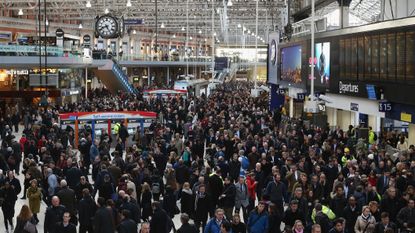
The Rail, Maritime and Transport (RMT) union has announced 27 days of strikes during December as part of a long-running dispute over the role of train guards.
The union said South Western Railway (SWR) staff had “no choice” but to take industrial action because SWR “refuse to give assurances” on the role of guards, says the BBC.
SWR says it is “extremely disappointed” by the planned strikes, which will run over New Year’s Eve into New Year’s Day.
Subscribe to The Week
Escape your echo chamber. Get the facts behind the news, plus analysis from multiple perspectives.

Sign up for The Week's Free Newsletters
From our morning news briefing to a weekly Good News Newsletter, get the best of The Week delivered directly to your inbox.
From our morning news briefing to a weekly Good News Newsletter, get the best of The Week delivered directly to your inbox.
A spokesperson for the train operator said: “The deliberate targeting of services up to, and during, the Christmas period is typical of the lack of concern the RMT continue to have for our customers.”
Strikes will last from 2 December until the end of New Year’s Day, breaking only for the general election on 12 December, and for Christmas Day and Boxing Day – “when there are no trains running anyway”, says The Guardian.
The strikes will start at one minute past midnight on the first day, and run until one minute to midnight on the last day.
Mick Cash, the RMT’s general secretary, blamed SWR for the union’s decision to strike: “As long as the company continues to refuse to give assurances on the future operational role of the guard, we will remain in dispute.
“It is wholly down to the management side that the core issue of the safety critical competencies and the role of the guard has not been agreed.”
SWR provides a daily average of 600,000 passenger journeys, operating out of Britain’s busiest railway station, London Waterloo, to regions including Surrey and Hampshire, says the Guardian.
SWR released a statement saying it had offered to keep guards on all trains, and the union was “purely focused on keeping control of train doors in a misguided attempt to hold power over the industry.
“Whilst we have shown commitment to the role of the guard by introducing over 80 additional guard roles since the start of our franchise, the RMT do not have the long-term interests of either our customers or our colleagues, including their members, at the heart of their actions.
“We remain committed to finding a solution that will help us build a better railway for everyone.”
Create an account with the same email registered to your subscription to unlock access.
Sign up for Today's Best Articles in your inbox
A free daily email with the biggest news stories of the day – and the best features from TheWeek.com
-
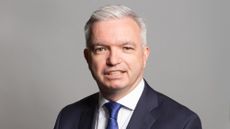 Mark Menzies: Tories investigate MP after 'bad people' cash claims
Mark Menzies: Tories investigate MP after 'bad people' cash claimsSpeed Read Fylde MP will sit as an independent while party looks into allegations he misused campaign funds on medical expenses and blackmail pay-out
By Arion McNicoll, The Week UK Published
-
 'Another day of chaos in DC'
'Another day of chaos in DC'Today's Newspapers A roundup of the headlines from the US front pages
By The Week Staff Published
-
 6 scenic white water rafting destinations to get your heart racing
6 scenic white water rafting destinations to get your heart racingThe Week Recommends Have a rip-roaring time on the water
By Catherine Garcia, The Week US Published
-
 Driving home for Christmas: 20m UK car journeys expected this week
Driving home for Christmas: 20m UK car journeys expected this weekSpeed Read First Covid-free Christmas in three years plus rail strike means this year’s festive getaway ‘set to be biggest ever’
By The Week Staff Published
-
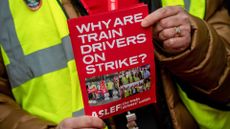 Rail strikes: whose side is the public on?
Rail strikes: whose side is the public on?Talking Point Opinion split over who is to blame for month of train disruptions following failed talks between transport officials and unions
By The Week Staff Published
-
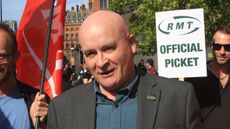 Mick Lynch: the veteran trade unionist leading rail walkouts
Mick Lynch: the veteran trade unionist leading rail walkoutsWhy Everyone’s Talking About The RMT has reportedly balloted for strike action 200 times under Lynch’s leadership
By The Week Staff Published
-
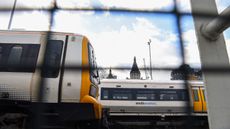 Rail strikes: is Britain on track for a ‘summer of discontent’?
Rail strikes: is Britain on track for a ‘summer of discontent’?Speed Read The ‘biggest rail strike in modern history’ is planned for next week
By The Week Staff Last updated
-
 ‘See it. Say it. Sorted’: is it the end of the line for train announcements?
‘See it. Say it. Sorted’: is it the end of the line for train announcements?Speed Read The transport secretary has pledged a ‘bonfire of the banalities’ on England’s railways
By The Week Staff Published
-
 New evidence points to final resting place of missing MH370
New evidence points to final resting place of missing MH370Speed Read Findings of ocean study fuels call for reopening of search for lost Malaysia Airlines jet
By Joe Evans Last updated
-
 UK to bring in airport Covid tests for arrivals
UK to bring in airport Covid tests for arrivalsSpeed Read MPs call for stricter border measures as South African variant of coronavirus spreads
By Chas Newkey-Burden Published
-
 UK records biggest jump in transport use since pandemic began
UK records biggest jump in transport use since pandemic beganSpeed Read Monday rush hour sees spike in commuters across country as trains return to 90% of pre-coronavirus services
By Gabriel Power Last updated